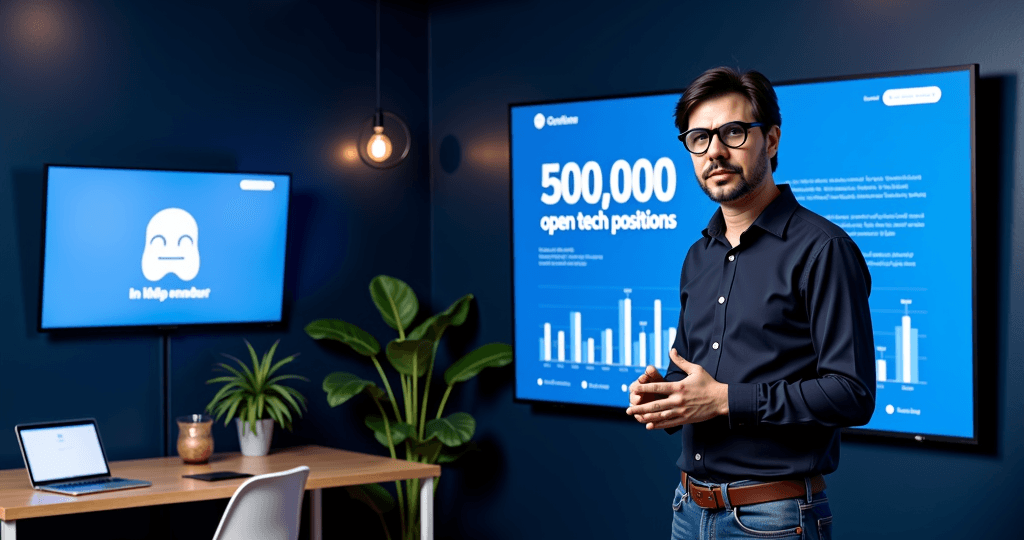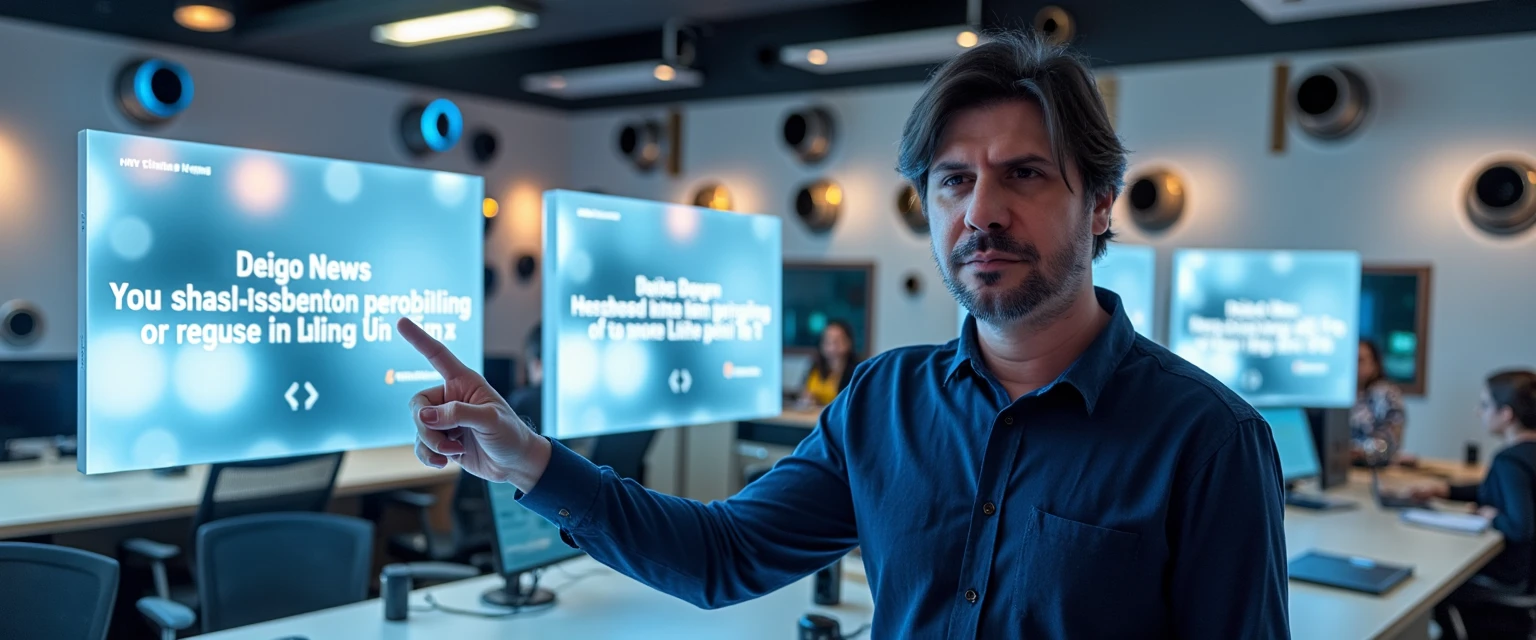AI Radar: Brazil Faces Shortage of 500,000 Professionals as Companies Revolutionize Operations with Artificial Intelligence
April 14, 2025 | by Matos AI

The numbers are alarming and reveal a Brazilian paradox that I have observed for years: while the adoption of Artificial Intelligence (AI) is accelerating in several sectors of the economy, we face a critical deficit of qualified professionals to lead this transformation. According to data revealed by executives from Microsoft and Google, Brazil currently has 500,000 open positions in the technology sector that cannot be filled.
This is not a one-off problem, but a structural one that affects everyone from startups to giants like Itaú, Nubank and iFood. And the consequence is clear: we run the risk of falling behind in the global race for technological innovation.
The AI Talent Shortage in Brazil
During the Brazil Conference, an event organized by students from Harvard and MIT, Tânia Constantino, CEO of Microsoft in Brazil, issued a warning that should mobilize the entire innovation ecosystem: “Professions will be transformed, not eliminated. If we don’t have the capacity to transform people to enjoy these jobs, we will have vacancies.”
Join my WhatsApp groups! Daily updates with the most relevant news in the AI world and a vibrant community!
- AI for Business: focused on business and strategy.
- AI Builders: with a more technical and hands-on approach.
Fábio Coelho, president of Google Brazil, complemented this view by comparing Brazil’s numbers with those of the United States and China, which produce proportionally more scientists and mathematicians. The conclusion is unquestionable: we need a “state plan” to train these professionals.
This is a topic that deeply moves me. In my work with innovation ecosystems, I have seen how the shortage of AI talent represents a real barrier to the development of startups and the digital transformation of traditional companies.
The Silent Revolution of AI in Brazilian Logistics
While we discuss the training of new professionals, AI is already transforming vital sectors of the Brazilian economy. According to report from Valor Econômico, logistics service providers are investing heavily in artificial intelligence, convinced that access to accurate information in real time will be the competitive differentiator of the future.
Companies such as Log-In Logística Integrada are developing AI platforms that will increase customers’ access to information about the services provided, as well as enable precise monitoring to ensure operational efficiency. Jadlog is implementing an AI project to optimize its transportation operations, inspired by European initiatives.
The result? The expectation is to reduce the cost per kilo and kilometer of the transported package from 10% to 20%. At BBM Logística, which expects to make 25 million deliveries this year, AI is being implemented gradually, with the prospect of monitoring 80% of the company's processes over the next three years.
These concrete cases show that AI is not a distant promise, but a reality that is already transforming the competitiveness of Brazilian companies.
Education: A Fertile Field for AI Applications
In the educational sector, advances are also significant. According to research carried out with more than 13 thousand Brazilian teachers, the use of AI allows a reduction of up to 85% in the time required to create assessments.
The introduction of AI tools, powered by content provided by educators themselves, has significantly improved efficiency in teachers’ routines. This not only allows for the creation of more detailed lesson plans, but also improves interaction with students.
A concrete example is the Maieutics platform, which has already generated more than 100,000 assessment questions, impacting the lives of more than 1 million students. This case demonstrates the transformative potential of AI in education and how we can use technology to enhance, rather than replace, human work.
The New Dynamics of the Labor Market
The news of the last 24 hours also reveals a fundamental shift in the way companies are approaching hiring and human resource management. Shopify CEO Tobias Lütke has implemented an innovative policy: there is only hiring if the AI cannot do the job.
This approach aims to ensure that AI use is maximized before adding new human resources, reflecting a new era in business management that prioritizes technology in operations. In addition, the integration of AI proficiency will also be a criterion in performance evaluations.
We are, therefore, facing a profound transformation in the job market, where the ability to work with AI becomes not only a differentiator, but a fundamental requirement for employability.
The Energy Challenges of AI Scaling
Another crucial aspect highlighted in the news is the environmental impact of AI expansion. According to Estadão, the race to develop artificial intelligence is driven by tiny silicon chips called GPUs, which are being integrated into new supercomputers in data centers around the world.
The increased demand for electricity to operate these centers raises concerns about sustainability. OpenAI, for example, plans to build facilities that would consume more electricity than 3 million homes. This is a significant challenge that we need to address to ensure that the expansion of AI is sustainable in the long term.
Creativity and AI: New Frontiers
In the field of creativity, the YouTube announced an AI tool which allows the creation of custom instrumental tracks, promising to transform the way creators produce soundtracks for their videos.
This evolution of Dream Tracks is integrated into Music Assistant and allows creators to specify the desired musical style and instruments to be included in the song, alleviating the burden related to copyright.
Similarly, AI tools to create drawings from photos are transforming creative possibilities by allowing users to specify desired artistic styles and customize their creations.
These innovations show how AI is democratizing access to artistic creation, a theme I have always defended in my lectures on the future of work and the intersection between technology and creativity.
Predictive Maintenance: Industrial AI
In the industrial sector, the AI is making predictive maintenance more accessible, helping companies avoid failures before they happen. Applying AI allows you to predict problems in advance, saving time and money.
Companies are adopting this technology to optimize their operations, reducing equipment downtime and managing their maintenance routines more efficiently. The potential of AI in the industrial sector is significant, standing out as a fundamental solution to improve productivity.
The Risk of Facade AI
Finally, an important warning: a startup founder was accused of deceiving investors by claiming that a shopping app used artificial intelligence, when in reality it was powered by human workers in a call center.
This case raises concerns about the credibility of startups that promote themselves as AI-based, and also about diverting investment from legitimate initiatives in the sector. The issue highlights the importance of transparency and credibility in the use of technology to raise funds.
In my experience with startup acceleration, I always emphasize the importance of honesty in communicating with investors and customers. Building a business on false premises is not only unethical, but unsustainable in the long run.
What to do in this scenario?
The news of the last 24 hours paints a complex and challenging picture. On the one hand, we see significant advances in the application of AI in various sectors of the Brazilian economy. On the other, we face a critical shortage of qualified professionals and structural challenges that need to be overcome.
As I have argued in my lectures and mentoring sessions, we need an integrated approach that involves:
- Accelerated training of professionals: Universities, businesses and government need to work together to develop AI training programs that are accessible and effective.
- Investment in research and development: We need to encourage the creation of domestic AI technologies, reducing our dependence on foreign solutions.
- Smart regulation: It is essential to create a regulatory environment that protects data and privacy, but also encourages innovation.
- Democratization of access: AI cannot be a technology exclusive to large corporations; small businesses and startups also need access to these tools.
In my mentoring sessions with companies and startups, I have helped leaders develop strategies to integrate AI into their businesses in an ethical and efficient way. The key is to understand that AI is not an end in itself, but a powerful tool to solve real problems and create value.
Brazil has the potential to be a global player in the AI era, but this will require a coordinated effort and a long-term vision. As an entrepreneur who has followed the evolution of the Brazilian innovation ecosystem for more than two decades, I firmly believe that we are facing a historic opportunity.
We can't miss this chance.
✨Did you like it? You can sign up to receive 10K Digital's newsletters in your email, curated by me, with the best content about AI and business.
➡️ Join the 10K Community here
RELATED POSTS
View all



